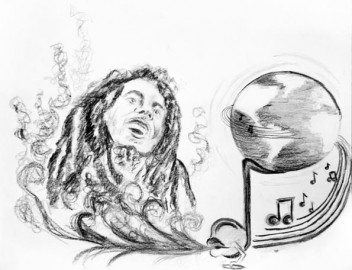Bob Marley: A Man of Influence

The Guardsman
Emma Winkles
On April 20, the Marley documentary directed by Kevin MacDonald was released, showing footage of Marley, his family, the people he grew up with in Jamaica and other musicians who helped mold his ideas and music.
In a world filled with prejudice due to the color of our skin and cultural differences, one man who felt this oppression turned that negativity around into a lyrical beat that touched the hearts of people worldwide and united them with the power of his words, known to many as Bob Marley.
The 144 minute documentary emphasized Marley’s extremely hard work ethic and competitiveness, although it took some time for people to start recognizing the beauty and reflectiveness of Marley’s lyrics, he was willing to make his message heard through the power of his music.
Marley wanted to make it known that his motives weren’t to make money, but to spread a message.
Eventually when he started to reel in the dough, a journalist in the documentary asked him about his wealth to which he responded, “does possession make you rich? My rich is life.”
Marley may have worked hard, but he also knew how to play hard. He was well known for his every day intake of the ganja.
Kevin Brown a student who is president of the City College cannabis club called Students for Marijuana Access and Rescheduling Today (SMART) said, “There are several different strains with unique qualities and effects.”
Marley, for example, used it as inspiration and a way to relax his mind – similar to those who enjoy a beer or two at the end of a long day.
“It’s not unhealthy, like government propaganda makes it out to be,” Brown said, yet we seem to have been socialized to believe otherwise.
Marley was identified so much with marijuana that the documentary flaunted how his reputation was tied in perfectly well with his fans. During a concert in Africa his fans yelled the words “ganja” in association to his name.
“It shouldn’t be a main focus cuz there’s way too much other shit for the authorities to focus on,” said full time City College student Amani Johnson during an interview on campus.
Jazz Howard, City College student and friend of Johnson agreed and said, “just don’t smoke and drive.”
31 years after his death, Marley’s message of love and unity reigns, and his music continues to move the souls of the masses.
“To me personally, Bob Marley being an icon in reggae music, and reggae music itself, unifies all people- it’s inclusive to me,” Johnson said. Her family attends the Sierra Nevada reggae festival every year because of their deep love for reggae music.
The documentary also touched into Marley’s many love affairs, It wasn’t hard to believe that Marley was such a ladies man.
With the amount of passion and striking musical lyrics about life and work, it was impossible for women not to fall for him.
The richness of his life and his passion to live and learn lead him to identify himself as a Rastafarian, a religion developed in Jamaica in the 1930’s that worships God and his reincarnate self, Haile Selassie I, who was the Emperor of Ethiopia from 1930 to 1974.
“This is my identity,” Marley said, referring to his dreadlocks which is a fundamental part of being a Rastafari.
Clips from the documentary showed Marley dancing aggressively, fearless and completely lost in the music, tossing and shaking his dreadlocks as if to release all the animosity he ever felt so that all that was left was joy.
Rita Marley, Bob’s wife said during the documentary, “this is where Bob found himself. He wasn’t just black or white, it was just one love.”

Comments are closed.